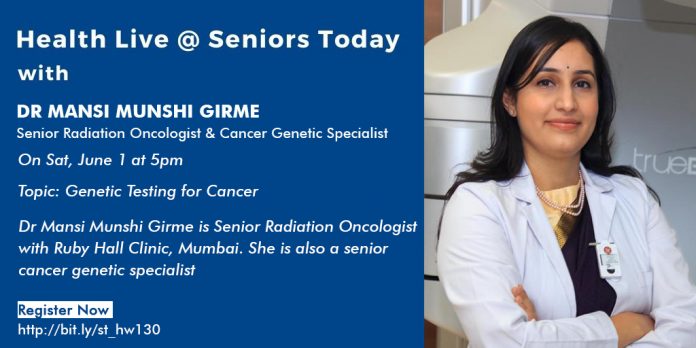On 01 Jun, 2024, Seniors Today hosted their Weekly Health Live Webinar with Dr Mansi Munshi Girme, a Senior Radiation and Cancer Genetic Specialist who spoke on and answered questions about Genetic Testing for Cancer.
About Dr Mansi Munshi Girme
Dr Mansi Munshi Girme is a radiation oncologist working at the Ruby Hall Clinic, Pune since 2017. Prior to that she did her MD in Radiation Oncology from the Tata Memorial Hospital (TMH), Mumbai where she was the recipient of gold medal for MD as well as the Agarwal Gold Medal.
While working at TMH Mumbai, she also underwent dedicated training in clinical cancer genetics and has experience in evaluation of routine and rare hereditary cancer syndromes. She started a Cancer Genetic Clinic at Ruby Hall in 2017.
She is an active member of the multidisciplinary tumour board Ruby Hall Clinic and Oncology Group of Pune and regularly participates in academic and teaching activities and conferences. She has been a part of several clinical studies as well as national and international publications.
She treats Head & Neck, Gynaecological, Breast, Urogenital, Thoracic, Gastrointestinal, Neuro/spine, Bone & Soft tissue, Paediatric and Haematological malignancies with radiotherapy. She also does palliative radiotherapy and management.
She is experienced in the following techniques: IMRT, IGRT, RapidArc/VMAT, DIBH (cardiac sparing) radiotherapy, stereotactic body radiotherapy(SBRT/SABR), stereotactic radiosurgery, 3D conformal radiotherapy (3DCRT), brachytherapy & Total Body Irradiation (TBI).
All cancers are genetic in nature which means that all cancers arise due to a genetic mutation in the genes, which causes the cell to go rogue, resulting in the cell starting to divide; losing its control, escaping the inhibitory mechanisms- leading to division of the cell at an uncontrollable rate.
When we say all cancers are genetic, it does not mean all cancers are hereditary. While all cancers have their origin in a genetic mutation, these mutations are not always hereditary.
Approximately, 10- 15% of cancers are hereditary and are passed on from one generation to the next.
The remaining 85-90% of cancers are sporadic, which means that they occur at random, or due to carcinogenic exposure (for example, tobacco).
Red flags for a hereditary cancer can be:
Young age for diagnosis. Breast cancer- presently the leading cause for cancer in women.
Certain types of cancer- for example triple negative type of breast cancer needs to be evaluated for genetic testing
Cancer in a paired organ- for example kidneys
Strong family history of cancer- from both maternal and paternal side
Unique cancers such as medullary thyroid cancer
Once the hereditary origin of the cancer is confirmed, the patient is advised genetic counselling- for both the patient and his/ her family, explaining to them the need and implications of genetic testing.
Genetic testing is a simple blood draw test. The reports and results take about 1 month to come.
However, when the result is received, the patient and the family need to again be counselled about the implications of the result- on the treatment and the psychological and emotional aspect.
Presently, we don’t have any way or means to change your genes or genetic makeup, however there are preventative measures
that we can take- not only for the patient in question but also the family members.
This includes prophylactic surgery.
The most commonly muted and affected hereditary gene is BRCA which is associated with breast- ovarian cancer syndrome. For which you can do prophylactic risk reductive breast surgeries, oophorectomy- to reduce the chances for breast and ovarian cancer, respectively.
If the patient does not want to undergo an extensive and invasive surgery, screening and surveillance for the cancer is strongly advised. With this approach, you may not be able to stop the cancer from developing, but you can diagnose it at the earliest, giving the patient a better chance of survival and prognosis.
Early detection does not only help with a better prognosis, it also changes the course of treatment and management.
Once a hereditary cancer is confirmed, the family members, blood relatives also need to be tested.
Few examples for hereditary cancers include:
Breast cancer
Colorectal cancers
Endometrial and uterine cancers
Urogenital cancers
Hereditary cancers do not skip generations. Which means that if it is not passed from the mother to the child, it will be passed along any further down the generations.
Children are not advised to have genetic testing. We wait till they are older and can understand the disease and reason for testing. Genetic testing is not advised in minors.
Genetic testing costs around Rs 20-30,000, for a comprehensive study, which is understandably a significant amount. And the results are completely confidential, unless you have used your insure to get yourself tested.



